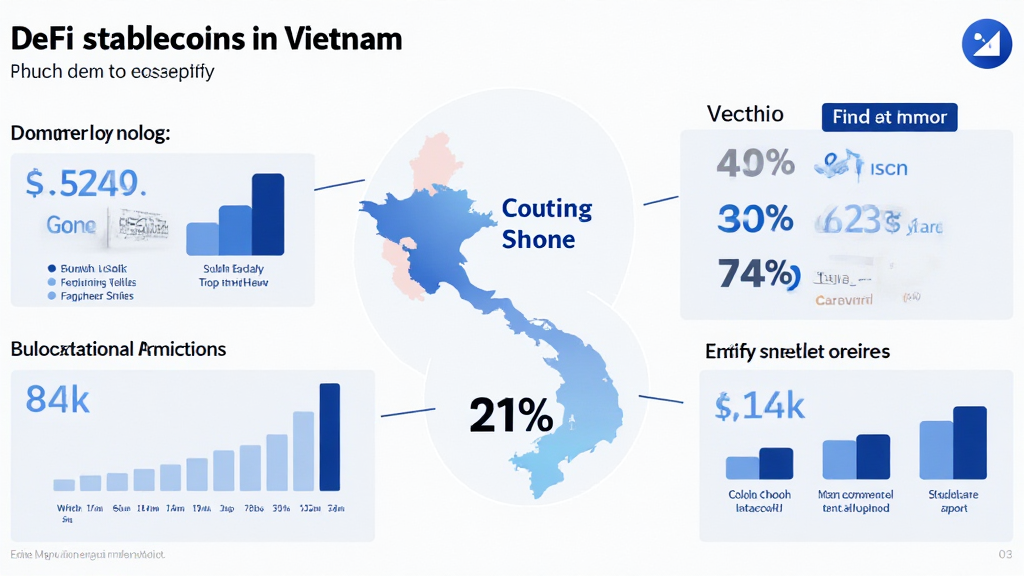Introduction
In 2024, the value of cryptocurrencies in Vietnam reached an astounding $12 billion, highlighting the nation’s rapid acceptance of digital assets. With this surge, decentralized finance (DeFi) has caught the eye of investors and tech innovators alike, particularly the role of stablecoins.
Stablecoins, a class of digital assets pegged to traditional currencies like the US dollar, provide necessary price stability in the volatile cryptocurrency market. As Vietnam continues to adapt to a more digitized economy, the rising interest in DeFi solutions—especially stablecoins—promises to revolutionize how financial transactions occur.
This article delves into the Vietnam DeFi stablecoins landscape, examining their growing influence, regulatory challenges, and potential applications.

Understanding DeFi and Stablecoins
Before we get into the specifics of the Vietnamese market, let’s clarify what DeFi and stablecoins are:
- DeFi: Short for decentralized finance, DeFi refers to a range of financial services built on blockchain technology that aims to offer traditional financial services in a decentralized manner.
- Stablecoins: These are cryptocurrencies designed to minimize price volatility by pegging their value to an external asset, commonly fiat currencies.
Stablecoins are becoming critical in the DeFi ecosystem as they allow users to transact without the fear of price fluctuations. They act as a bridge between the volatile crypto markets and the stability of fiat currencies.
The Growth of Vietnam’s DeFi Landscape
Vietnam has emerged as one of the most active countries in the cryptocurrency landscape. According to recent reports, the user growth rate for crypto assets in Vietnam has been approximately 20% yearly. The allure of quick profits combined with increasing technological adoption has encouraged many young investors and tech enthusiasts to venture into the DeFi sector.
A significant driver of this trend is Vietnam’s burgeoning fintech industry, supported by a vibrant community of startups and a young population eager to embrace innovation.
Rise of DeFi Platforms in Vietnam
Various DeFi platforms have sprung up in recent years, each offering unique features for users:
- Liquidity Pools: Users can lock funds to earn returns on their digital assets, promoting token circulation and availability.
- Lending Platforms: Individuals can lend their stablecoins and earn interest, creating passive income opportunities.
- Decentralized Exchanges (DEXs): These platforms allow for seamless trading of cryptocurrencies without intermediaries, greatly enhancing accessibility.
Potential Challenges for DeFi in Vietnam
Despite its rapid growth, the DeFi space in Vietnam faces challenges:
- Regulatory Uncertainty: While the government expresses a positive stance towards blockchain technology, there are still unclear regulations regarding cryptocurrencies and DeFi applications.
- Security Concerns: As evidenced by the $4.1 billion lost to hacks in the DeFi space in 2024, security is a significant concern. Users need to be aware of audit practices when engaging with platforms.
Decentralized Stablecoins: The Game Changer
In the context of DeFi in Vietnam, decentralized stablecoins are gaining traction. Unlike traditional stablecoins, which are centralized and require trust in a single issuer, decentralized stablecoins rely on algorithms and collateral to maintain their value. This introduces a level of transparency and trust that is fundamental to the ethos of DeFi.
Benefits of Decentralized Stablecoins
- Increased Stability: By using collateral, decentralized stablecoins can remain stable even during market turmoils.
- Transparent Mechanisms: DeFi protocols promoting decentralized stablecoins offer real-time visibility over transactions, reducing the risk of fraud.
- Accessibility: By transcending borders, decentralized stablecoins are accessible to anyone with internet access, greatly expanding the financial inclusion seen in Vietnam.
Real-life Applications of Vietnam DeFi Stablecoins
Stablecoins are not merely theoretical constructs; they are actively shaping how financial transactions are conducted in Vietnam:
- Cross-border Transactions: With traditional international transactions often taking hours to settle, stablecoins can facilitate instant transfers, benefiting both individuals and businesses.
- Remittances: Vietnam has one of the highest remittance inflows, and utilizing stablecoins can streamline and reduce the costs associated with sending money home.
- Smart Contracts in Trade Finance: Decentralized stablecoins can automate trade finance utilizing smart contracts, thus cutting down processing time and costs.
Case Studies: Successful Stablecoins in Vietnam
Several platforms utilizing stablecoins are beginning to make waves in Vietnam:
- VND Stablecoin (VNDC): Pegged to the Vietnamese Dong, VNDC allows for seamless transactions within the local ecosystem.
- Other Leading Stablecoins: Platforms like Tether (USDT) and USD Coin (USDC) have also gained popularity, contributing to trading volumes in various Vietnamese exchanges.
Conclusion
In conclusion, the landscape of Vietnam DeFi stablecoins signifies a vital shift towards decentralized finance in this emerging market. With promising growth rates, innovative DeFi platforms, and the increasing prominence of stablecoins, Vietnam stands at the forefront of the DeFi movement.
However, it is crucial for investors and users to be aware of regulatory landscapes, security risks, and to stay informed through credible sources like officialcryptonews. As Vietnam continues to embrace this digital revolution, the collaboration between technology and finance offers unprecedented opportunities.





